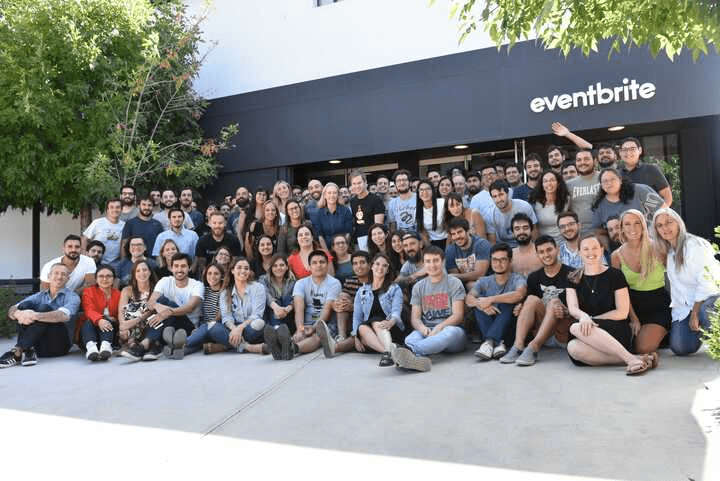Eventbrite: Empowering employees to switch off
Managing employee stress and burnout through generous annual leave policies is good for business.
Why You Should Care
The pandemic was bad for employees' mental wellbeing.
In response, Eventbrite gave everyone employee the first Friday off the month off to reset.
Find out more about the world of work at the events company.
Eventbrite’s mission is to “being the world together through live experiences”; in 2021, the company hosted more than five million events in almost 180 countries with over 660,000 creators.
The company’s purpose has only become more important over the past two years; COVID-19 lockdowns and restrictions meant loneliness and social isolation has reigned supreme for many across the world.
Eventbrite employees live and breathe this mission every day. Maisha Gray-Diggs, vice-president of global talent acquisition at Eventbrite, tells UNLEASH that she asks her talent team to really emphasize that purpose when recruiting; “We have a mission that matters, and we always talk about how…[that] mission really matters to your job”.
Linked to this, Gray-Diggs believes that Eventbrite is special because its “people-first focus”, and that drives a “connected culture”.
The need for good leaders
Importantly, Eventbrite’s culture comes from the top, and particularly co-founder and CEO Julia Hartz. “There’s an empathy…in how she leads” Eventbrite’s 800-strong workforce – it has grown significantly over the last 15 years; it was just a 10-person startup back when it was founded in 2006.
According to Gray-Diggs, who states “who wouldn’t be a fan-girl of [this] woman”, Hartz role models how to treat people correctly, and always makes herself available to talk to candidates or employees about the company.
Whenever teams make decisions, they ask themselves “What Would Julia Hartz do?”, rather than necessarily creating and implementing a formal policy.

Maisha Gray-Diggs, vice-president of global talent acquisition, Eventbrite.
Gray-Diggs shares an example of one of her team members who was pregnant ended going into labor very prematurely. The employee in question was texting Gray-Diggs while she was on her way to the hospital to give birth.
As a result, “when they came out the C-Section, we already had the baby on the company insurance. In other companies, the employee has to think about how do I get the baby on the insurance? But I knew the baby needed to have coverage, he was going to go to the NICU. I didn’t need to go figure out the policy; I just did the right thing”.
But it is not just about leaders and managers caring for others, “at whatever level you are, we want you to feel empowered to take care of others”. This is part of the reason why Eventbrite is “normalizing children in meetings”. “You can truly bring your whole self [to work] without judgement”, explains Gray-Diggs.
The importance of switching off
Given that empathy and caring for others is so core to the world of work at Eventbrite, it is no surprise that a top HR priority for the events company is wellbeing.
In addition to providing free coaching and therapy sessions to all employees – plus private medical insurance and gym membership – in October 2020 Eventbrite started really prioritizing work-life balance by giving employees the first Friday of every month off to focus on their wellbeing.
So-called ‘BriteBreak Fridays’ were conceived six months into the pandemic because “we knew employees were burnt out, even if they weren’t saying it”. The initiative “allows people to really have permission” to take time for themselves.
BriteBreak Fridays started as a trial, but “the feedback…was overwhelmingly positive, so we decided to make it permanent” for all employees globally in March 2021.
“It is a natural rhythm of the business now”, but Gray-Diggs notes that not every team can take BriteBreak Fridays every month. If the first Friday of the month doesn’t work for an employee – maybe because they work in finance and that’s when budgets are due or they are a recruiter and they have interviews with candidates that day – then they can take another day – “it’s not use it or lose it”.
Another way that Eventbrite prioritizes employees’ work-life balance is through “very friendly time off policies – friendlier than other places”, but also “with the encouragement to take it”.
The company’s holiday policy is called Take The Time You Need (TTTYN) – it isn’t the same as unlimited paid time off, but “we’re at the max of what we can offer for each country”.
“Our CEO will be taking a long break for the summer” and therefore “role modelling for everybody” the importance of taking time off and switching off.
Gray-Diggs explains: “We encourage people to be off when they’re off.” This is in response to lived experiences elsewhere “I’ve worked in other companies where people have unlimited time off, but you can’t take it, you just don’t feel like you can take it”.
In addition to having “trust” within teams that “employees [will] truly take the time they need, and disconnect how they need”, Eventbrite also takes advantage of tech, including Google Schedule and Slack’s Send It Later tool.
In addition, when people are on leave, “everyone has a backup, so they can actually be off and don’t feel the stress of work”, explains Gray-Diggs.
She shares: “I am backing up the HR business partner right now”, and admits “your backup isn’t [always] a perfect one for one, I tell you, I am not a good business partner, but I can help remove roadblocks and direct, so that when my partner comes back she doesn’t feel like the big stuff wasn’t handled”.
Using the office for in-person connection
The conversation turned beyond culture and wellbeing, and towards the future of work. Flexible working had always been part of the world of work at Eventbrite – approximately 50% of employees work outside of the US, and the company has always operated around core working hours.
Gray-Diggs also shares that since the company has grown by acquisitions – CrunchBase has recorded 10 acquisitions for Eventbrite, including Lanyard in 2013, Queue in 2016 and Ticketfly in 2017 – “we became less tethered to an office”.
According to Gray-Diggs, the company’s working model going forward is “really about what works for you”, whether that is purely from home, purely from the office, or a hybrid blend of the two.
Of course, this means the office has a role in the future of work at Eventbrite. Counterintuitively, “we’re using it for offsites” as “we’re already paying for it” – in the past, they would have flown everyone to Spain or Florida and put booked a hotel space.
In addition, “we have a bi-weekly meeting with the CEO called Hearts to Hartz, a play on her last name” – it is a 30-minute session to talk about what’s “top of mind for her”. Employees are starting to go in in-person for that meeting, and then using that time to connect.

Ultimately, Grag-Diggs is clear that “we’re not forcing people to go back”, but about figuring how to build connection both in and outside the office.
“The 2023 challenge for people in HR [is] to figure out how to make connection feel real and authentic” while teams are distributed.
“Occasional travel to connect teams in person can certainly help, but need to find ways to make people feel connected on a daily basis” like they would have been if they were in the office all together five days a week.
Eventbrite and Gray-Diggs are therefore thinking about initiatives like virtual offsites and how to send gifts to global teams. The HR team is also looking at a new culture tool “to help us understand how to work across cultures [because] we can’t overlook the globalization” of the workforce.
She is clear that the job of HR professionals and business leaders is to “figure out how we still make people feel connected to a culture without pinball machines and lattes” in the office.
“Flexibility is…the baseline” in the ‘Great Resignation’
Gray-Diggs is clear that remote work is here to stay, and flexibility at work is a major cause of the ‘Great Resignation’. “People are opting out because they don’t have that flexibility”, and Eventbrite’s talent acquisition is hyper-aware of that as they recruit.
“We know that flexibility is top of mind, but we also cognizant that it’s not enough… Flexibility is almost the baseline. I don’t think you can even get a candidate to pick up the phone if you don’t have that as a baseline”.
The next thing they want is a mission and purpose-led company, which Eventbrite is; “they want more connection”. Then they want to know what impact they will have in this job.
Gray-Diggs shares that many employers say employees can have an impact, but they don’t mean it – but at Eventbrite “there isn’t another person that does your job”, so you own your role and the huge responsibilities that come with it.
Linked with the impact piece, career development is central to Eventbrite’s talent acquisition strategy. The events company offers a learning and development budget of $1,000 per person – they can use it how they like. “We also have a number of internal resources like Udemy courses, and subscriptions for Harvard Business Review”.
Gray-Diggs concludes that she is having conversations with her peers, and they are all facing the same challenges. But it seems those who get it right around “connected culture, growth, and development” will be the ones who thrive.
+++
The world’s HR conference and expo is back! Don’t miss out on UNLEASH World in Paris this October. >>More here<<
Sign up to the UNLEASH Newsletter
Get the Editor’s picks of the week delivered straight to your inbox!

Chief Reporter
Allie is an award-winning business journalist and can be reached at alexandra@unleash.ai.
Contact Us
"*" indicates required fields
Partner with UNLEASH
"*" indicates required fields